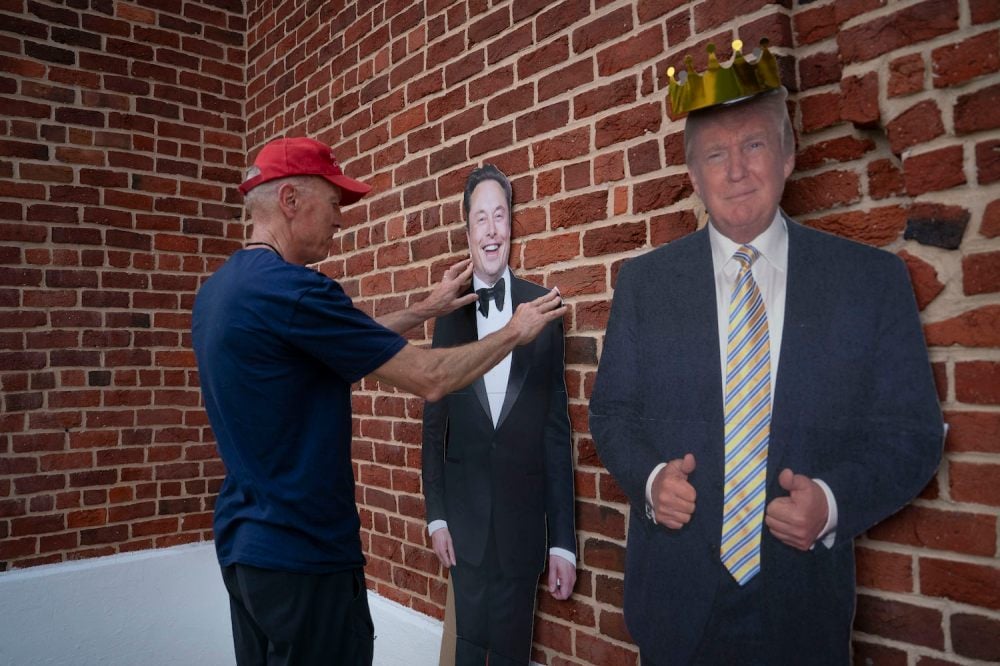The on-again, off-again feud between U.S. President Donald Trump and billionaire Elon Musk is on again—and the world’s richest man has kicked things into overdrive. Musk announced over the weekend that he is forming a new political party to challenge both the Democrats and Trump’s Republican Party, seemingly based on an X poll Musk conducted that showed 65 percent of respondents wanted him to do so.
“When it comes to bankrupting our country with waste & graft, we live in a one-party system, not a democracy,” Musk wrote in a post on X. “Today, the America Party is formed to give you back your freedom.” (It’s not clear whether Musk has taken any steps to actually form the party or get it on ballots.)
Musk supported Trump’s 2024 election campaign with tens of millions of dollars before joining his administration to slash federal spending under the unofficial Department of Government Efficiency (DOGE). But the two men had a very public falling out that stemmed mainly from the so-called One Big Beautiful Bill that Republicans passed last week. The spending bill will add more than $3 trillion to the U.S. federal deficit over the next decade, which Musk has slammed as “debt slavery.”
Trump has largely been dismissive of Musk’s efforts even while railing against the billionaire, writing in a lengthy post on Truth Social that third parties “have never succeeded in the United States – The System seems not designed for them.” Speaking to reporters on Sunday, Trump said Musk “can have fun with it but I think it’s ridiculous.”
And during a cabinet meeting on Tuesday, Trump said a third party would “probably help” him. “Third parties have always been good for me—I don’t know about Republicans, but for me,” he added.
Trump is correct in noting that past efforts to challenge the United States’ two dominant parties have mostly fallen flat. But could Musk’s mind-bogglingly deep pockets, huge megaphone, and reputation as a disrupter change that?
A Brief History
Despite the popular conception, third parties have been a feature of American political life throughout U.S. history. The modern Republican Party itself originated as a third party in the 1850s, solidifying its position with the 1860 election of Abraham Lincoln, who remains the only third-party candidate to have won an election. Others have tried and failed since then, including former President Theodore Roosevelt, whose Progressive Party (better known by its nickname, the “Bull Moose Party”) enjoyed short-lived success in the 1912 election but collapsed just two years later.
More recent notable examples include Texas billionaire Ross Perot, whose political career began with criticism of the federal budget deficit (sound familiar?). Perot contested two presidential elections, running as an independent in 1992 and then in 1996 as a third-party candidate under his new Reform Party. Perot won 19 percent of the vote the first time and 8 percent of the vote the second time as Democrat Bill Clinton was elected and then reelected.
Trump himself briefly flirted with the idea of contesting the 2000 election as a third-party candidate under the Reform Party that Perot created. But although he joined the party and won its California primary, he ultimately dropped out of the race after concluding that the party didn’t provide the kind of support he would need to win a general election.
Former Democratic presidential candidate Andrew Yang and former Republican governor of New Jersey Christine Todd Whitman announced the Forward Party in 2022, but the party did not nominate a candidate in the 2024 presidential election. No Labels, a centrist group formed in 2010 by Republican and Democratic lawmakers, also abandoned its effort to put up a challenger last year. Robert F. Kennedy Jr. briefly ran for president in the 2024 election—first as a Democrat and then as an independent—before dropping out, endorsing Trump, and eventually becoming his secretary of health and human services.
The Obstacles
Third parties have faced an uphill struggle since Lincoln’s win cemented the Republican Party more than 150 years ago, in large part due to the quirks of the U.S. political system. Presidential candidates must get on the ballot in each state individually, with many states requiring tens of thousands of signatures from eligible voters during the campaigning period—not to mention the resources required to mount a national campaign. The U.S. presidential election’s “winner-take-all” format also means that even if a third-party candidate can gain a sizable chunk of the national vote, that won’t matter if they cannot ultimately get the biggest share.
“The existing parties have a lot of muscle. They have a lot of expertise, money, and they’re already there. So it’s very hard to break into that,” said Julian Zelizer, a professor of history and public affairs at Princeton University and a Foreign Policy columnist. Democrats and Republicans also tend to tweak their more expansive party platforms to absorb the best ideas from potential challengers. “That’s very hard for a third party to overcome—if the giant in the room will do what you’re promising to do, people will often take that choice,” he added.
It also simply comes down to entrenched voter behavior and muscle memory. “Even if they complain about the parties, even if they talk about another party, in the end they’re still comfortable on Election Day voting for one of the two that exist,” Zelizer said. “The frustration people exhibit is often rhetorical rather than in the way they vote.”
Yes, But…
Despite those challenges, no independent candidate or third party has had the kind of immense resources that Musk has at his disposal, and the world’s richest man has shown he can achieve a lot in politics by simply throwing large amounts of money toward his goals.
Musk cannot run for office himself, having been born outside the United States, but he cemented his kingmaker capabilities with Trump’s election and could conceivably now do the same to oppose his agenda and the Republican Party he leads. The billionaire has indicated that he may start with local and down-ballot races, an arena where third parties have traditionally had more success.
“The way we’re going to crack the uniparty system is by using a variant of how Epaminondas shattered the myth of Spartan invincibility at Leuctra: Extremely concentrated force at a precise location on the battlefield,” Musk wrote on X. “One way to execute on this would be to laser-focus on just 2 or 3 Senate seats and 8 to 10 House districts,” he added in another post. “Given the razor-thin legislative margins, that would be enough to serve as the deciding vote on contentious laws, ensuring that they serve the true will of the people.”
Zelizer remains skeptical that Musk will succeed in overcoming the historical and systemic constraints that have thwarted third-party attempts in the past, but he acknowledged that Musk’s capabilities are unprecedented and unpredictable. “We have not had a single individual with this much money, and who seems willing to spend lots of it,” he said. Musk’s ownership of—and 222 million follower base on—X also gives him the kind of global megaphone no candidate has been able to command.
Finally, the political polarization of the United States’ current moment could leave the two-party system more ripe for Musk’s brand of Silicon Valley disruption than ever. “We are in a period where the parties seem to be more broken than we think,” said Zelizer. “As we see with Trump’s success, things are just different—we don’t know exactly why, but maybe there are vulnerabilities that we just haven’t seen yet, and when they meet someone with this many resources, they might be challenged.”
The post Third Parties in America Usually Fail. Can Elon Musk Change That? appeared first on Foreign Policy.




